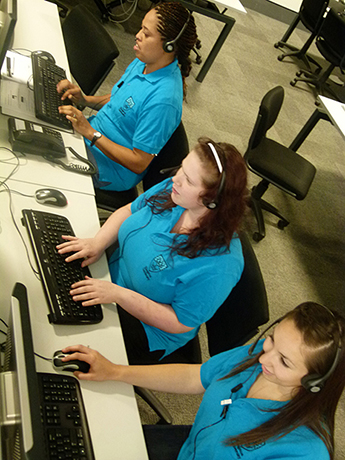Students urged to plan ahead to snap up final few Kingston University places through Clearing as A-level results day nears
Posted Wednesday 30 July 2014

Kingston University's Deputy Director of Student Administration, Dr Andy Homer, who oversees its annual Clearing hotline call centre operation, said students who didn't quite secure the grades they hoped for or changed their minds about courses would still find they had plenty of options open to them. His dedicated team of 120 specially trained hotline operators is now in the process of gearing up to handle a high volume of calls once the lines go live. Last year there were more than 15,000 attempted calls to Kingston University's hotline on results day and, during the following weeks, volunteers helped hundreds of students find their way on to a suitable degree.
Although it could seem daunting, applicants should not be intimidated by the Clearing process, Dr Homer advised. "Our operators are all handpicked and committed to ensuring that everyone who contacts the hotline has the opportunity to really explore the choices available to them," he said. "What's more, many of our hotline operators are students themselves, so they understand just how stressful A-level results day can be. Kingston University will also have academic staff from a wide range of courses on standby so callers can find out everything they need to know about the degree programmes they're most interested in and decide what's best for them."
Being well organised would be crucial to helping prospective students get the most out of their call, Dr Homer added. Having the right details, such as their Clearing number and UCAS ID and full details of qualifications to hand, including subjects, grades, dates obtained and exam boards, would be particularly vital.
One of the people on the other end of the phone when the Clearing hotline goes live will be admissions tutor Dr Hannah Moir, who is now a senior lecturer in health and exercise physiology at Kingston University. She knows exactly what callers will be going through, having made her own journey through the Clearing process when she first enrolled at the then University of Wales Institute Cardiff, and can still remember the trepidation she felt prior to receiving her A-level results.
"My grades were delayed due to an error with the exam board, which meant that I couldn't start contacting universities until a week after the Clearing hotlines had opened," Dr Moir recalled. Although playing the waiting game was not easy, she discovered that it gave her a valuable opportunity to consider which courses best suited her interests. "Like a lot of people, my choice of career had swayed considerably during my A-levels, but I was lucky to come across a newly-launched course in health, exercise and sport that really captured my interests," Dr Moir said. "Looking into courses online and checking what was available was an important part of the process that allowed me to understand what options were available to me. I definitely think it's a vital first step for anyone who may find themselves going through the Clearing process this August."
Dr Moir admits that, at the time, she did not fully appreciate the impact her call to the Clearing hotline would have on her future career. "When the moment came to pick up the phone, I was extremely nervous but I realise now that I needn't have been so worried," she said. "The process was simple and straight forward and it was reassuring to speak to friendly, helpful operators.
"If it hadn't been for the emotions and issues I had to deal with during Clearing, I wouldn't necessarily be in the job or the field that I am in now," she explained. "I was able to identify a course that I was happy to study that gave me the confidence, knowledge and insight that's so important to my role as both an academic and admissions tutor today. Despite my nerves at the time, passing through Clearing remains one of the best decisions that I have ever made."
As well as plenty of research on potential universities, organisation was a key to getting the most out of Clearing, Dr Moir said. "It's important to remember that there will be a lot of people calling the hotlines so, if students can't get through straight away, they shouldn't panic. I really recommend that students save the number for particular universities' Clearing hotlines into their phones so they can quickly redial them if they need to. That call to the Clearing hotline is also the moment to find out anything that a student might want to know about a certain course, so it's important to think about any questions they might want to ask. Admissions tutors and hotline operators are great at helping callers get a sense of what a certain course is like and whether it's really right for them."
Kingston University's Clearing hotline will open at 8.30am on 14 August. Specially trained assistants will be on hand to help callers, matching them up with the last few remaining places on courses starting in September. Those with the grades needed to fill vacancies will be transferred to academic staff to find out more about what is on offer.
Course vacancy lists will be published on the Universities and Colleges Admissions Service (UCAS) website and in the Daily Telegraph newspaper. Students applying through UCAS will be able to check their application status on the Track page. Those without a place will see a Clearing button to guide them to their electronic Clearing number which needs to be given to universities when calling the Clearing phone lines. Students should also have their A-level, GCSE and any other relevant results such as BTECs to hand and should always make the call themselves, as offers cannot be made to parents or friends.